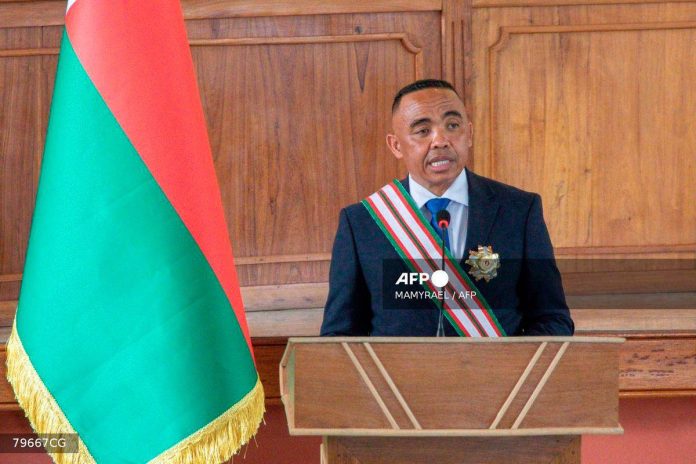ANTANANARIVO: Army colonel Michael Randrianirina was sworn in as Madagascar’s president following a military power grab that sent former president Andry Rajoelina fleeing from the country.
The 51-year-old colonel led the CAPSAT army unit that mutinied and joined anti-government protesters before announcing the military had taken power on Tuesday.
Randrianirina declared this moment a historic turning point for the country during his swearing-in ceremony where he exchanged his army uniform for a suit.
He promised sweeping reforms for the impoverished island nation where anger over chronic power cuts initially sparked protests last month.
The new president vowed to work with all national forces to draft a new constitution and establish electoral laws for future elections and referendums.
His main mission involves thoroughly reforming the country’s administrative, socio-economic and political governance systems.
Randrianirina thanked Madagascar’s youth for leading the protests that ousted Rajoelina and claimed the army intervened at the top court’s request to prevent anarchy.
The ceremony in the capital attracted military officers, politicians, youth protest representatives and foreign delegations from the United States, European Union, Russia and France.
A few dozen citizens gathered outside the constitutional court hoping to witness their new president’s inauguration.
Shopkeeper Faniry Randrianaridoa expressed happiness about potential change while remaining cautiously optimistic about improvements to basic services like water and electricity.
Facing international criticism, Randrianirina insisted the takeover wasn’t a coup and highlighted the constitutional court’s backing of his presidency.
The new leader addressed foreign delegations in French, inviting them to support Madagascar’s national renewal process during his swearing-in ceremony.
Local media reported that Randrianirina had already met with a Russian delegation on Thursday before his official inauguration.
He told journalists that the international community’s strong presence demonstrated their respect for Madagascar’s national sovereignty.
The president confirmed that youth representatives would be consulted before the appointment of his new government.
Rajoelina’s supporters condemned the constitutional court’s support for the CAPSAT commander as procedurally illegal and destabilising.
They maintain that Rajoelina remains the legitimate leader and is working to solve the country’s pressing problems.
Government forces faced accusations of harsh crackdowns on protesters with numerous reported casualties before CAPSAT’s intervention.
The army unit announced on October 11 that it would refuse orders to shoot protesters, marking a crucial turning point in the uprising.
Rajoelina’s office confirmed he fled the country the same weekend CAPSAT supported protesters, citing fears for his personal safety.
Media reports indicated the former president was evacuated aboard a French military plane to Reunion before travelling to Dubai.
This power grab represents the third military transition in Madagascar since independence, following coups in 1972 and 2009.
Madagascar becomes the latest former French colony in Africa to come under military control since 2020, joining Mali, Burkina Faso, Niger, Gabon and Guinea.
The Indian Ocean island remains one of the world’s poorest nations despite abundant natural resources and rich biodiversity.
Approximately 80% of Madagascar’s 32 million population lives in poverty according to World Bank benchmarks.
The African Union and regional bloc SADC announced they would send fact-finding missions while calling for constitutional democracy to be upheld. – AFP








